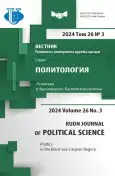Social Sciences in Armenia: Rethinking Politics and International Relations After 1991
- 作者: Dunamalyan N.1, Elamiryan R.1
-
隶属关系:
- Russian-Armenian University
- 期: 卷 26, 编号 3 (2024): Politics in the Black Sea-Caspian Region
- 页面: 531-542
- 栏目: THE CASPIAN REGION AND THE CAUCASUS: SECURITY AND DEVELOPMENT
- URL: https://journal-vniispk.ru/2313-1438/article/view/322421
- DOI: https://doi.org/10.22363/2313-1438-2024-26-3-531-542
- EDN: https://elibrary.ru/BCANRJ
- ID: 322421
如何引用文章
全文:
详细
The development of social sciences in the post-Soviet space is perceived as a rather unexplored layer of knowledge, representing a whole range of problems that arise in societies in transition (starting from the educational system to the publication of specific academic works). From this perspective, the article is analyzing the case of development of social sciences in Armenia starting from 1991, when it received independence after the dissolution of the Soviet Union. The article argues, that in the case of Armenia (as well as some post-communist societies), we can see a change in discourse with shifting the emphasis from the historiographical paradigm to the sociocultural or humanitarian one. The following situation arises: the existing theories of political science and international relations overlap with the realities of transitional societies crises of political development in the country. As a result they may not always give the necessary results, since the scientific community has not yet developed a specific approach in the context of the development of academic schools of thought and localized general theoretical approaches. Based on the above the article tests the main hypothesis, which is that the development of social sciences in Armenia is characterized by fragmentation or excessive obsession with specific issues of international relations. In terms of the development of political science in Armenia the article checks three domains: development of political science as a scientific discipline after the disintegration of the Soviet Union; teaching of political science and international relations; as well as the level of think tanks and expert community. The article concludes that despite a 30-year development process, political science in Armenia remains fragmented and needs, one the hand, more cooperation inside the field, and, on the other hand, more state support for better concentration and efficiency.
作者简介
Norayr Dunamalyan
Russian-Armenian University
编辑信件的主要联系方式.
Email: norayr.dunamalyan@rau.am
ORCID iD: 0000-0003-0239-0594
PhD in Political Science, Assistant Professor, Department of Political Science
Yerevan, Republic of ArmeniaRuben Elamiryan
Russian-Armenian University
Email: ruben.elamiryan@rau.am
ORCID iD: 0000-0002-8724-3376
PhD in Political Science, Assistant Professor, Department of World Politics and International Relations
Yerevan, Republic of Armenia参考
- An Assessment of Research Capacities in Social Sciences and Humanities in Armenia. (2011). Caucasus Institute Research Papers, #4. Yerevan, 48 p
- Atoyan, V. (2021). Emerging industry of think tanks in Armenia. Messenger of ASUE, (6), 106-125. https://doi.org/10.52174/1829-0280_2021_6_106
- Chulitskaya, T., Matonyte, I., Gudelis, D., & Sprincean, S. (2022). From scientific communism to political science: The development of the profession in selected former Soviet European states. In Opportunities and Challenges for New and Peripheral Political Science Communities (pp.55-81). Palgrave Macmillan, Cham. https://doi.org/10.1007/978-3-030-79054-7_3
- Fursov, A. (2014). The Soviet system and the poverty of political science (the USSR in the light of some political science schemes. Knowledge. Understanding. Skill Journal, (4), 81-97. (In Russian)
- Margarov, A. (2004). The development of the Political Science in Armenia: Status, Problems, Prospects. Political science in the post-Soviet states. Moscow: RAS, INION, Russian Association of Political Science, (2), 9-29. (In Russian)
- Patrushev, S.V., & Filippova, L.E. (Eds.). (2015). The history of the Russian Political Science Association. Moscow: Aspect Press. (In Russian)
- Sartori, G. (1970). Concept misformation in comparative politics. The American Political Science Review, 64(4), 1033-1053. https://doi.org/10.2307/1958356
- Sokolov, M., & Titaev, K. (2013). The provincial and indigenous science. Antropological forum, (19), 239-275
- Spannagel, J., & Kinzelbach, K. (2022). The Academic Freedom Index and its indicators: Introduction to new global time-series V-Dem data. Qual Quant. https://doi.org/10.1007/s11135-022-01544-0
- Vorobiev, D. (2004). Political science in the USSR: Formation and development of the scientific community. Polis. Political studies, (4), 169-178. (In Russian) https://doi.org/10.17976/jpps/2004.04.14
补充文件









